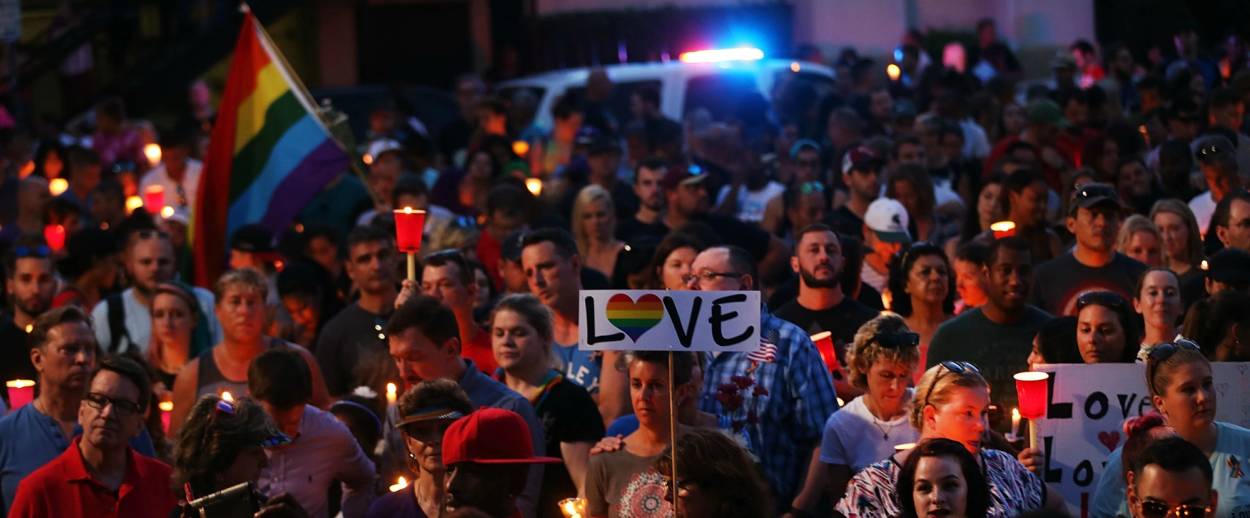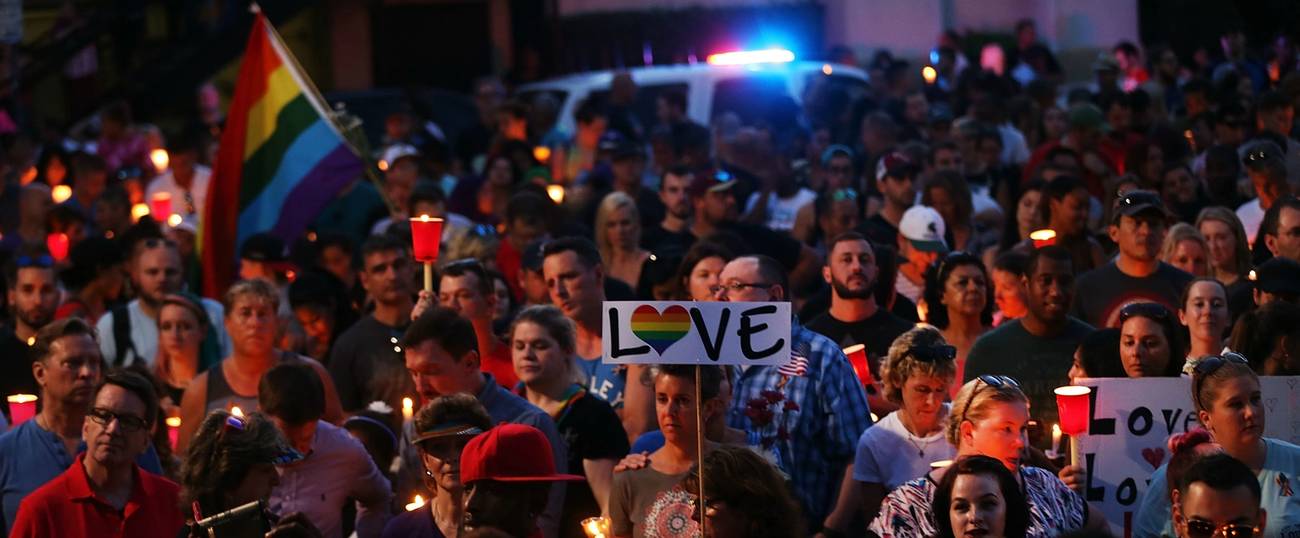Hate Also Kills
In the wake of the Orlando shooting, a rabbi remembers her former intern, a transgender woman who took her own life in March




It’s hard explaining to my children why some people seek to do them harm simply because they’re Jews. It’s harder still that I can’t protect them from the violent hatred that stalks the streets of Jerusalem, Paris, and even New York. But they suffer no naiveté when it comes to the blessings and burdens of being Jewish.
Attacks against the LGBT community make up an outsized proportion of hate crimes in the Unites States, doubling those against African Americans and surpassing those against Jews. My children have only ever expressed pride in me as a gay woman. They’ve advocated for greater LGBT inclusion on campus and celebrated marriage equality in step with their generation’s commitment to freedom.
The Star of David pendant hanging proudly around my neck accustoms me to people’s glances. Periodically, I get glares too; it’s a reminder to me to behave in ways that bring honor upon my people and tradition. Rarely have I felt it’s endangered me. I feel the same pride whenever I introduce Andi as my wife and present our combined six children—a happy, well-adjusted, modern family.
My children have never feared for my safety—and neither have I—until the Orlando shooting that left 49 innocent people dead in a gay nightclub.
In the wake of the Orlando massacre, I wonder if I, too, should consider myself “at risk.” Andi and I enjoy strolling hand in hand in our suburban New Jersey neighborhood and we never shy away from appropriate displays of affection. Could there be a pathological homophobe with a Sig Sauer MCX rifle living next door? Not likely. I live my life relatively confident that I will not be killed for being gay.
But LGBT lives are in danger in another way because it’s not only guns and violence that kill. Prejudice and bigotry kill people, too. Words themselves can’t murder, but hatred and vilification of another human being can lead someone towards suicide. And it’s here where the LGBT community is indeed high-risk.
While studies differ slightly, 92 percent of LGBT teens say they hear negative messages about their identities at school, the Internet, and from their peers. And while 77 percent say they believe things will get better, LGB teens are more than twice as likely to attempt suicide as heterosexual youth. More than thirty percent of transgender youth report at least one suicide attempt within the last year, and more than fifty percent will have attempted suicide by their 20th birthday.
This is a different kind of assault than Orlando. A mass shooting is a decidedly separate event than an LGBT suicide. But what they share, at least in part, is a society that hasn’t yet welcomed the breadth of sexual and gender identities that shape our families, neighborhoods, workplaces, and communities; a world that hasn’t yet learned to make every person feel beautiful and accepted.
It’s true that recent years have seen much more openness, but for many it’s still too little and it’s coming too late, just like it did for an intern of mine named Sam Price.
A transgender junior at Oberlin, Sam dreamed of becoming a rabbi and creating inclusive, open and welcoming spiritual communities, ones where no one feels marginalized or excluded. A leader in the Jewish and queer communities, Sam’s courage and compassion empowered many to embrace their own truths.
Sam understood that our sense of self is key to our well-being, and that in no small way it’s derived from the way others treat us. Walking through New York City, Sam interacted with every homeless person she encountered, seeing in his or her eyes a light she knew they, and we, all share; a light she felt compelled to affirm while most others walked on by.
She challenged religious ideas that tout belief in God as the path towards human caring, asking me, “Why turn to God to become closer to one another when we can just turn to each other?” Rather, she understood that being close to one another was the surest path to the Divine.
No doubt she learned that from her family and friends who embraced, supported, and most importantly, respected her. But when she called for the same from the wider universe, the response of love and acceptance wasn’t loud enough. In the end, Sam, a six-foot-tall lanky, hairy, dyed-blonde lacrosse player couldn’t see her place among the rest of us.
In March, on her 21st birthday, Sam attempted suicide. Several days later, as she lay dying in a hospital in Ohio, I was in New Jersey surrounded by 50 LGBT Jewish teens and their friends at our third annual Purim Unmasquerade Ball, an event Sam and I created that provides LGBT teens a space to shed the masks and disguises they too often feel pressured to wear.
Though she was far away, Sam’s spirit permeated the party: her artwork graced our posters, the vocabulary of sexual and gender diversity she compiled hung on the wall for all to absorb, and her energy pulsed through these kids as they sang and danced, unselfconsciously celebrating a Jewish community of gorgeous, unbridled variety. It was a moment of tragic irony like none other, filling me with dread and pride simultaneously.
As Sam’s life ended, she was saving another. As her soul faded, she was enlivening someone else’s. As her world succumbed to rejection, she was building one of love.
We shake our heads in disbelief and cry out at the morbid, murderous hatred unleashed on Orlando’s LGBT community last weekend, indeed upon all of us. We consume news voraciously: funerals for the dead, vigils for the wounded. We demand, futilely, that politicians enforce tougher guns laws.
But the most decisive activism isn’t only tears, prayers and firearm legislation. It’s supportive families. Compassionate hugs. Non-discriminatory bathrooms. Radically inclusive schools, synagogues, churches and mosques. It’s the presence of models, actors, athletes, politicians and professionals of every gender, sexual orientation and physique. It’s building a world that welcomes and protects infinite manifestations of humanity, love and beauty. Only then will we all be safe.
Guns and murderers kill. So does hate.
Rabbi Adina Lewittes is the founder of Sha’ar Communities, which promotes an innovative, pluralistic approach to building Jewish identity by creating multiple portals into Jewish life and community.